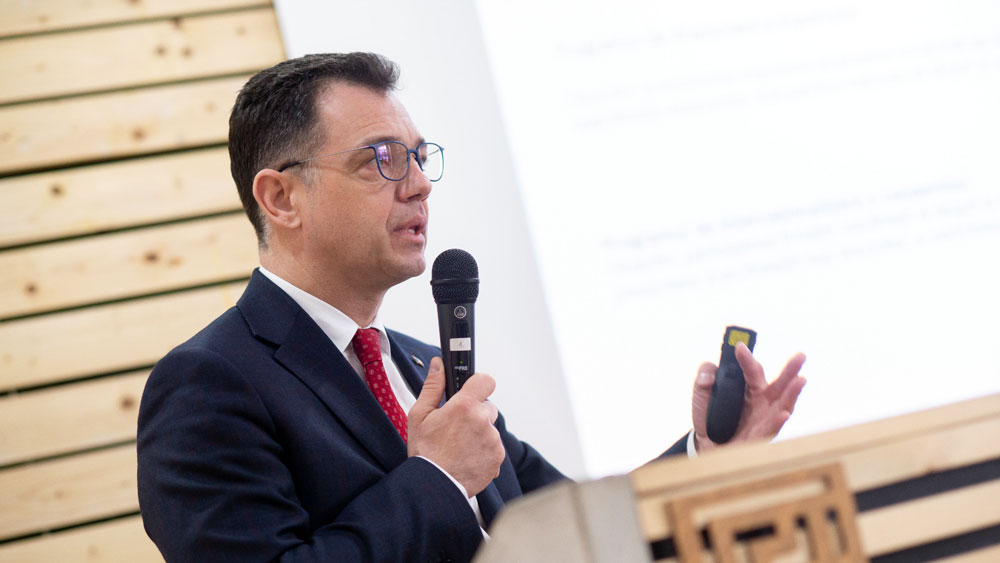Relaunch of Romanian exports
Between diplomatic priority and market criticism
Internationalization of business is an expression heard more and more often at various conferences or business forums, and it would be a real success if it happened for Romanian companies. Regional projects, business hubs have been repeatedly mentioned, but so far, we have too few examples of success. What should be done?
Presenting the investment opportunities offered by Romania and creating additional possibilities for Romanian companies to set up partnerships will be the objectives of foreign missions and economic forums, according to the Minister for Business Environment, Trade and Entrepreneurship, Stefan-Radu Oprea. At least this was the message conveyed to participants in the official session of the Days of Commercial Diplomacy meeting, held in the Aula Magna of the Academy of Economic Studies in Bucharest. He highlighted the importance of dialogue with the business environment and active involvement of all profile structures in Romania – chambers of commerce and industry, professional associations, employers’ organizations.
“It is necessary to boost activity on several levels: consolidating exports on traditional markets, counteracting trade deficit, identifying new extra-Community target markets, diversifying exports and attracting foreign investments,” Radu Oprea pointed out.
The Romanian official indicated the importance of boosting Romanian presence on the South American market, especially in the context of the negotiations for a trade agreement with Mercosur being a priority of the agenda of the Romanian Presidency of the Council of the EU. Delivery of competitive products and services on the market of the European Union, which remains the main economic and trade partner of Romania, should also be maintained.
In conclusion, Romania must continue its offensive for regaining traditional markets and opening new markets. Representatives of the business environment have the opportunity to use the expertise of commercial attachés to re-orient themselves to markets such as North Africa, the Persian Gulf or East Asia. Also, a closer and more applied collaboration between the Ministry for Business Environment, Trade and Entrepreneurship and the Ministry of Foreign Affairs will result in a stronger representation of Romania on the established target markets. Moreover, Romanian companies need to take advantage of the networking and European funding opportunities provided by the Enterprise Europe Network.
In turn, during the conference that took place on the occasion of closing the Swiss-Romanian Cooperation Program, Integrated Export Services for SMEs in Romania – a project that introduced in Romania the culture of thorough preparation for making exports (Passport to Export) – the conclusion of those present was that currently there is no coherent approach to the continuation of this program. The project has developed training modules to prepare export strategies for 80 exporters, to prepare them to go to foreign markets, to this end establishing regional centers in Ploiesti and Bacau.
“Unfortunately, this way of intervention at the level of exporters with potential, but which don’t know to address foreign markets, cannot be continued at optimal parameters, the centres needing further support to provide integrated services to both the first lot of exporters and others that should follow. Such an instrument named Passport to Export, in other countries (see the case of the UK), needs an integrated national instrument of intervention in the public policy for the support and promotion of exports. To be in line with the National Export Strategy that focuses on extending the base of exporters, integrating the Passport to Export formula in the system of support instruments would be a welcome solution, but there is no substantiation of such a scheme. The Passport to Export scheme is one of the failures of the National Export Strategy, together with the creation of the Trade Promotion Centre, the possibility of using local staff at the Consular Offices/Consular Economic Promotion Offices (BPCE), supporting export clusters, sectoral branding campaigns etc. The Romanian-Swiss Cooperation Program is a drop in an ocean because there are hundreds of companies that have export potential but cannot benefit from consistent training until such a scheme operates at national level,” says Costin Lianu, coordinator of the National Export Strategy 2004-2015, president of the Association of Export Business Centres (ACEX) and General Manager of USH Pro Business.
We want the number of Romanian companies with regional businesses to grow in the future. But the question is will Romania succeed in implementing effective instruments that will lead to the sustainable development of exports?



